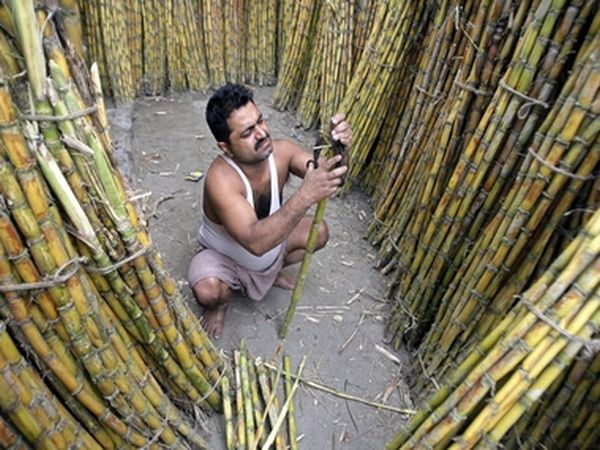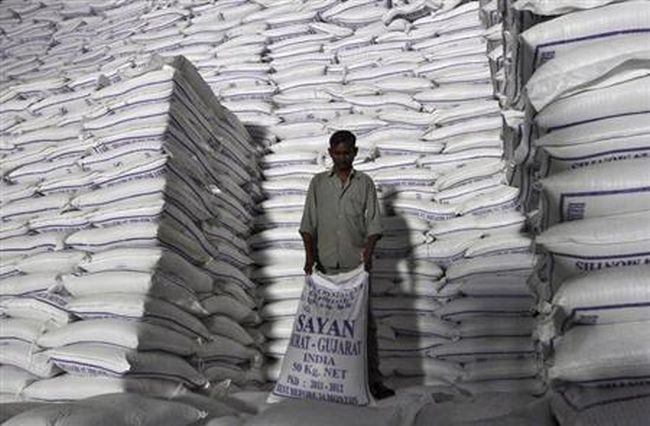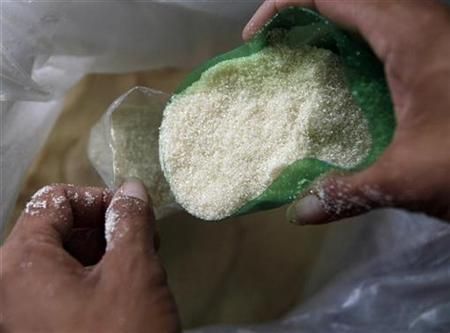Uttar Pradesh every year fixes the price at which sugar mills can buy sugarcane from farmers. For political reasons, it has always been kept high.

Uttar Pradesh's sugar crisis now also has the banks firmly in its grip.
The state government has asked the Union finance ministry to rein in the state-owned banks that, it alleges, are trying to interfere in the state's internal policy matters.
This came after State Bank of India (SBI) Chairman Arundhati Bhattacharya and Punjab National Bank Chairman K R Kamath wrote to the chief secretary of Uttar Pradesh, Alok Ranjan, that the state should rationalise sugarcane prices or else loans to sugar mills will turn bad.
The two banks together have an exposure of almost Rs 5,000 crore or Rs 50 billion to the sector.
Mr Ranjan, late last month, wrote to the finance ministry on the need to convey to the banks that "any interference in the state's internal policy matters is not appropriate" as it vitiates the situation in the sugar sector "with which lakhs of farmers are associated" and could "potentially agitate them", a report in The Financial Express said.

Uttar Pradesh every year fixes the price at which sugar mills can buy sugarcane from farmers.
For political reasons, it has always been kept high. This has made sugarcane the most attractive crop for farmers.
As a result, sugarcane acreage has risen consistently over the last several years.
This has spelt trouble for the mills. Most of them are unable to pay the farmers. The arrears have mounted to over Rs 2,500 crore or Rs 25 billion.
To resolve the matter, C Rangarajan, former governor of the Reserve Bank of India and head of the economic advisory council to ex-prime minister Manmohan Singh, had suggested that sugar and sugarcane prices should be linked - higher the price of sugar in the market, higher the price should be at which mills buy sugarcane from farmers and vice versa.

The mills feel this is fair. The current sugar price of Rs 28.50 a kg merits a sugarcane price of not more than Rs 230 a quintal.
This year's sugarcane price has not been announced; last year it was set at Rs 280 a quintal.
Naturally, the mills are scared to start operations this year unless a reasonable price for sugarcane is mandated.
This is where the banks enter the picture. Mills depend on them for working capital.
As a guarantee, the banks take stocks of sugar.
In September, the Allahabad High Court ruled that farmers will have the first right on these stocks.
Only after settling their arrears, the banks' turn will come.

The banks fear that this could delay payments to them.
They approached the Supreme Court against the verdict, but their plea was rejected.
This has made the sugar industry un-bankable. So rationalisation of sugarcane price is of the utmost importance for them.
The portents are ominous for the mills, too.
Unless the "financial viability of the sugar industry is restored by the state government, banks will not be able to provide any further facilities to the sugar industry in Uttar Pradesh", SBI's Ms Bhattacharya wrote in her letter.
Meanwhile, Maharashtra and Karnataka have adopted the Rangarajan formula.
If Uttar Pradesh does not reduce sugarcane price, the mills in these two states are expected to have a price advantage of Rs 5 to Rs 6 a kg of sugar.

The Uttar Pradesh mills fear these states will soon flood the markets in the north and east of the country, their traditional strongholds.
The freight cost from Karnataka to Delhi or Kolkata works out to around Rs 2 a kg.
This still leaves the Uttar Pradesh mills with a disadvantage of Rs 3 to Rs 4 a kg -pretty significant in the commodity business.
Uttar Pradesh had constituted a committee under the chief secretary in June to look into the whole issue of sugarcane prices. It was expected to submit its report in May but hasn't done so till now.
Actually, the final decision will be a political one. In these politically charged times, it will need great courage to slash sugarcane prices.
Sugar barons who met Chief Minister Akhilesh Yadav and Samajwadi Party patriarch Mulayam Singh Yadav found them non-committal. But a decision will have to be reached soon.

The mills are supposed to open towards the end of October, but there is no sign of that happening.
In case they don't do so till the middle of December, the farmers could erupt in protest.
They need to recover their investments and also clear the fields for the next crop.
Many have started to sell sugarcane to the gur and khandsari units for as low as Rs 150 a quintal.
There is great mistrust between the Uttar Pradesh government and the mills.
Last year, out of the mandated price of Rs 280 a quintal, the mills were required to contribute Rs 260, and the state chipped in another Rs 11.
The remaining money was to be paid by the government if the mills made a loss.
A committee headed by the agricultural production commissioner said that mills need be paid only Rs 6 a quintal to compensate their losses.
This was rejected outright by the mills, which said their losses worked out to the tune of Rs 40 to Rs 45 a quintal.
Last year too, the mills had raised a stink about high sugarcane prices and Uttar Pradesh had maintained it at the previous year's level. Such a move is unlikely to placate the mills this year, because the price of sugar has fallen from Rs 30.50 a kg last year to Rs 28.50 a kg now.
This means the capacity of the mills to pay for sugarcane is less than what it was a year ago. The choices are few. But politics could take precedence over pragmatism.











